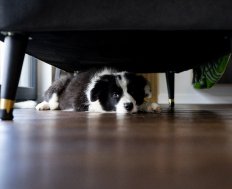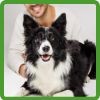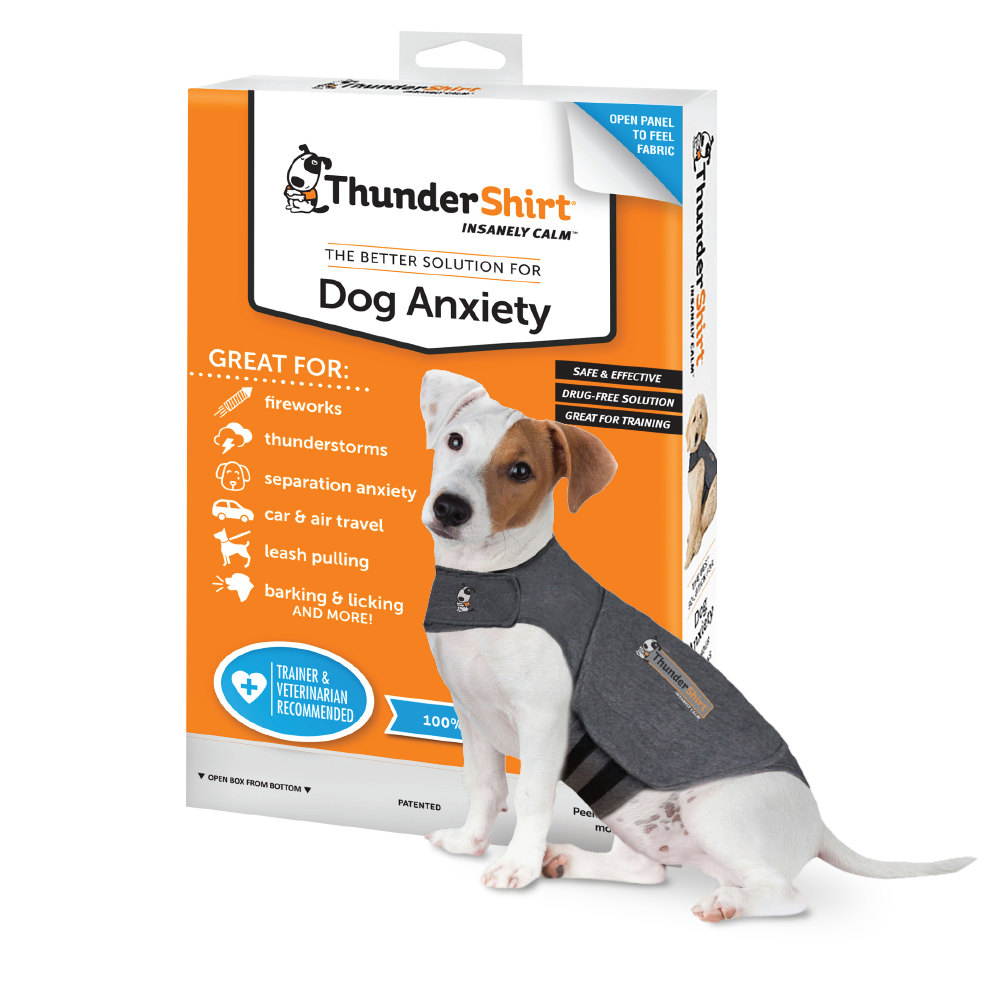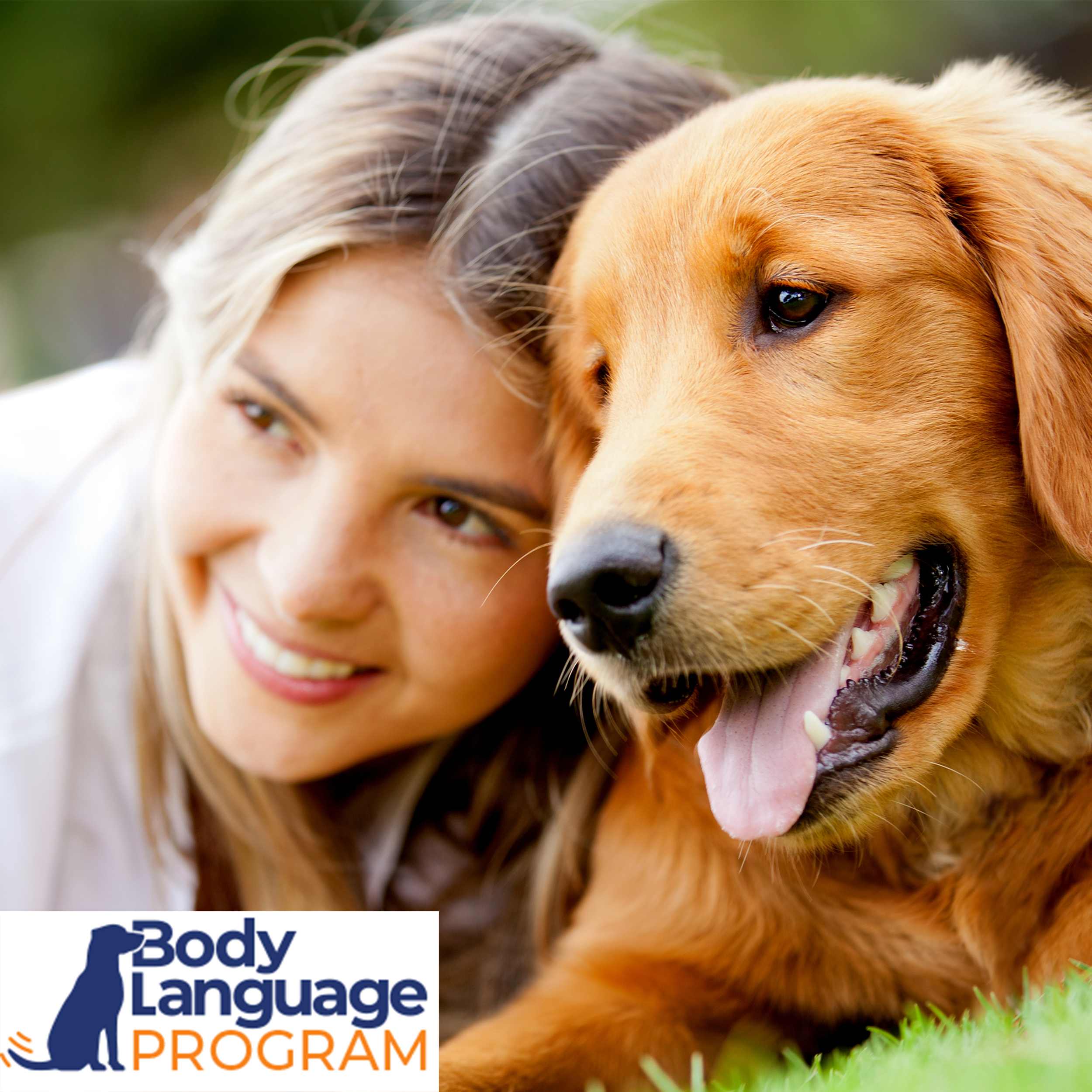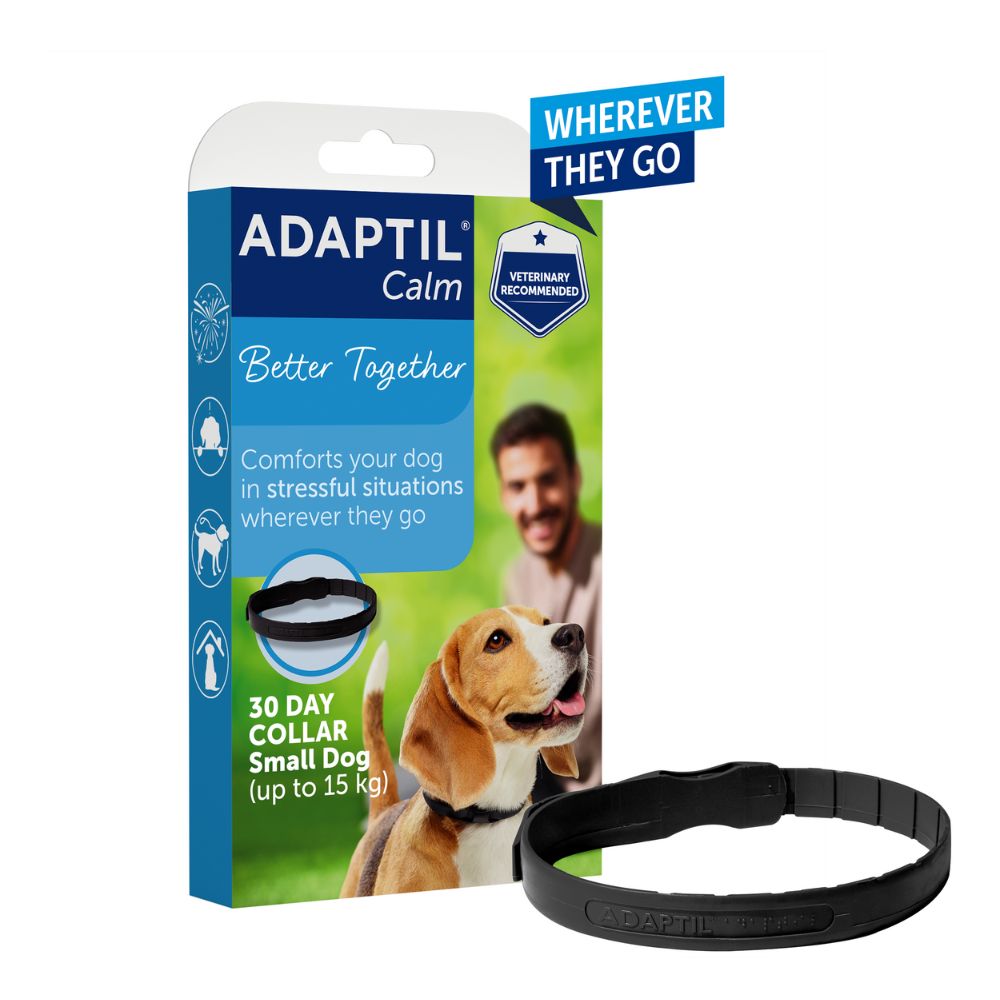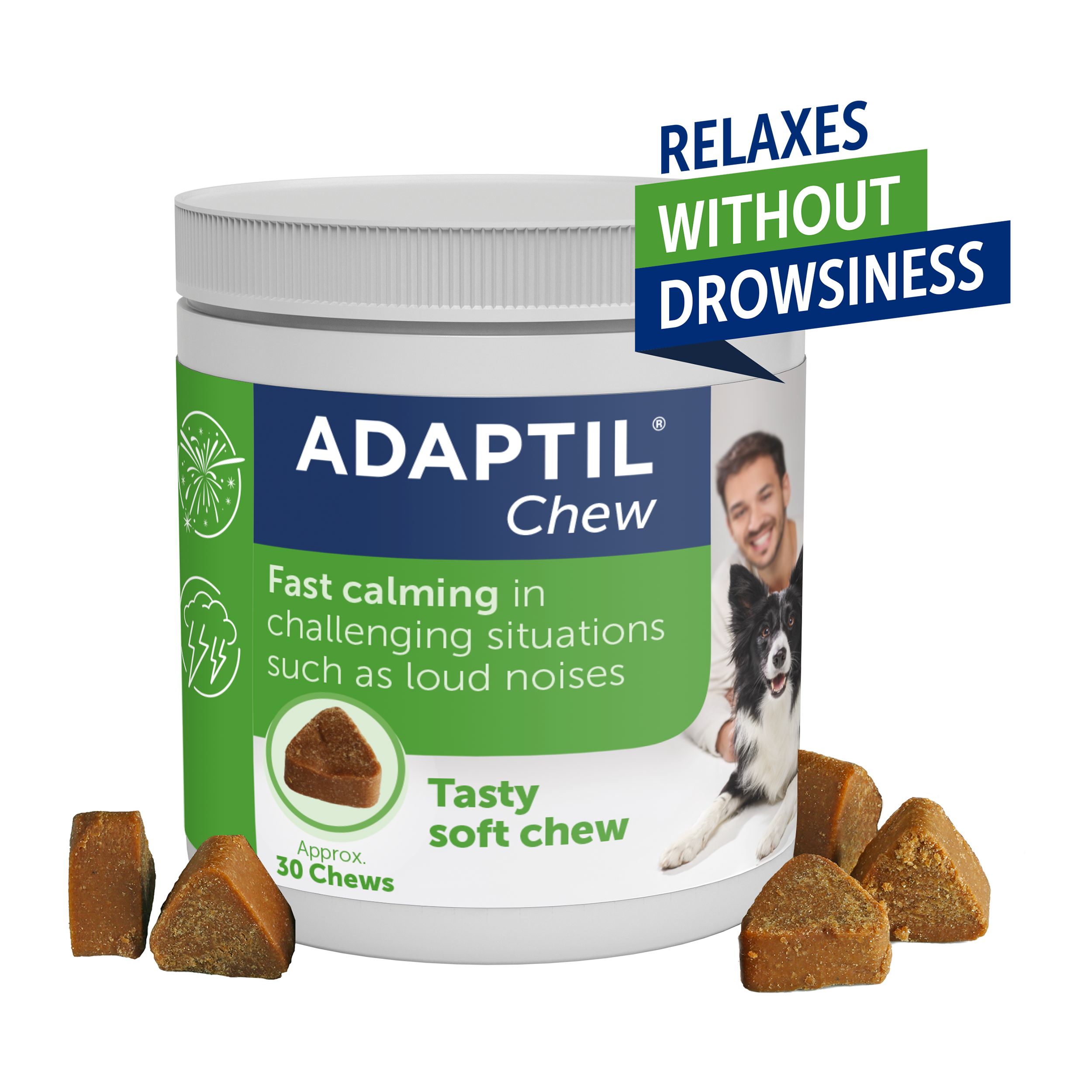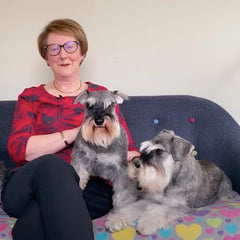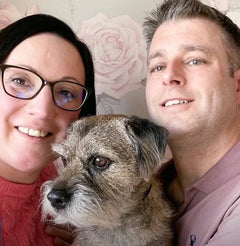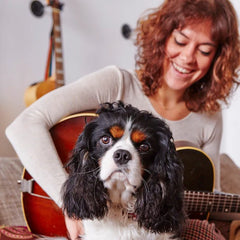HOW TO HELP IF YOUR DOG IS GENERALLY ANXIOUS
-
Why is my dog anxious?
- Some dogs struggle with many things in their lives, they are just generally anxious and need support in many situations.
- Speak to a professional for advice to best support your dog and understand their anxiety triggers.
- Many solutions exist, but it can take time to find the right one for your dog. Don't give up!
-
Combined calming solutions for anxious dogs
The best product solution choice for anxious dogs
- For a generally anxious dog, constant support is best so they are less likely to have any build up on fears. The best solution for this is the ADAPTIL Calm Collar. This ADAPTIL product provides 24/7 support and is there and ready for whenever your dog needs it.
- The ADAPTIL Calm collar provides a copy of a mother dogs natural Appeasing Pheromones for constant proven reassurance.
- Just pop on the ADAPTIL Collar and leave it on at all time. It is activated by the dogs body heat so it needs to fit snug to your dog.
Veterinary used and recommended!
-
Continue to be your dog's best friend
- Do not give up!! You will have good and bad days, the important thing is to keep going to try and help your dog feel more comfortable.
- Learn how to recognise the signs of dog anxiety - as each dog is different and recognising these signs early is key!
- Tackling the anxiety as soon as possible is best.
-
Regular exercise and activities
- Behaviourists recommend developing a routine for your dog. This can help them predict events throughout the day.
- You can help your pet be their happiest both mentally and physically by keeping them active! Enjoy regular interactions with your dog, whether it is exercise, playtime, training!
- Go step by step. Ask your accredited dog trainer's advice to find out activities your dog might enjoy or that would mentally stimulate them.
- Be consistent, do not overload your dog.
- Reward with your dogs favourite things – e.g. only use their favourite treat when
training for the anxiety.
-
Other things you can do:
- Seek help, its can be really helpful to have a training plan in place to ensure you are helping your dog build up a positive association with the existing fear.
- Use other products such as ADAPTIL Chews or a ThunderShirt for those times where you think they need additional support.
We recommend:
For dogs needing constant support at home and outside. Appeasing pheromones everywhere your dog goes.
To help very anxious dogs at specific times. Wrap around your dog's body, for an immediate calming effect.
-
Recommended by vets
-
Seen on TV
-
25 clinical studies published
-
20+ years of expertise
Tips to help your dog with anxiety
Many dogs suffer from anxiety. It's much more common than it might seem. You are not alone facing this challenge with your dog!
Our modern life can affect dogs - we live busy, noisy lives and expect our dogs to fit in with our expectations.
Sometimes, the circumstances of a dogs upbringing can lead to general anxiety e.g. life before your home or circumstances to breeding.
Pets suffer with anxiety everywhere and all year round. It can be due to many reasons such as travelling, meeting new people, going to the vets, fears of loud noises, vacuum cleaners, living in a changing environment...
First of all, try to understand what causes your dog's stress. Read our FAQ's to help you reduce your dog's anxiety.
Read how to recognise the signs of anxiety in your dog for more information and tips to support your dog.
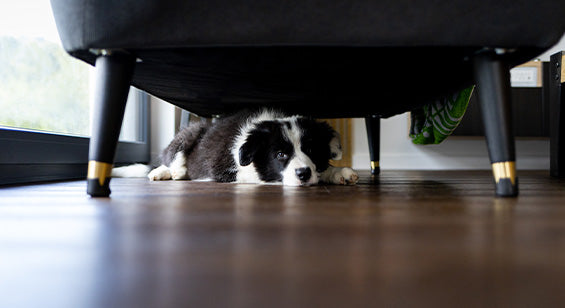
Frequently asked questions:
FREQUENTLY ASKED QUESTIONS - GENERALLY ANXIOUS DOGS
Find quick, expert-backed answers to the most common questions about ADAPTIL, dog behaviour, and how to create a stress-free environment for your canine friend.
WHAT ARE THE MOST COMMON SIGNS OF ANXIETY?
The common signs of anxiety or fear include:
- barking,
- shaking,
- scratching or licking themselves,
- pacing or restlessness,
- chewing,
- panting,
- drooling,
- toileting in the house.
WHAT CAUSES ANXIETY?
There are numerous reasons a dog can be fearful, including:
- Upbringing, some dogs are just genetically nervous and there is not always an obvious cause,
- Not socialised enough when young,
- Being left home alone can trigger separation related problems,
- Loud noises, such as fireworks or thunderstorms,
- A big change at home (a baby, someone leaving...), a new pet,
- Visitors,
- Car rides can be stressful, as the movement may be unsettling, and there are different sounds and the outside whizzes by,
- Vet visits can be linked to an unpleasant experience,
- Sometimes older dogs may experience a gradual loss of awareness, memory and perception, which may make them confused and anxious.
For dogs, socialisation training as a puppy is the best way to prevent later anxieties and fears.
Expose your dog to a wide range of situations, people and experiences in a gradual and positive way. This builds positive associations and helps them develop into well-balanced, confident dogs that are able to cope with new situations, rather than react fearfully to them.
WHAT CAN I DO TO HELP MY DOG'S ANXIETY?
Talk to a professional.
It is important to check there isn't an underlying medical problem affecting your dog e.g. pain can be a reason for many behavioural issues in dogs. Your vet or an accredited behaviourist can help you identify the possible triggers and underlying issues connected to your dog's anxiety.
Try to spend more time with your furry friend. It will help them for sure. The bond between you means that your dog values your presence, so being with them is beneficial for their mental health.
You can help your dog by creating a safe space at home for them to escape to when needed and relax undisturbed.
Routine exercise and activities are great to use some energy, keep their brain active and have fun together! Play and enjoy spending time together!
Read how to recognise the signs of anxiety in your dog for more information and tips to support your dog.
WHY IS MY DOG SHOWING SIGNS OF ANXIETY?
Many dogs suffer from anxiety. It's much more common than it might seem. Our modern life can affect dogs - we live busy, noisy lives and expect our dogs to fit in with our expectations.
Sometimes, the circumstances of a dogs upbringing can lead to general anxiety e.g. life before your home or circumstances to breeding.
Frequently asked questions:
FREQUENTLY ASKED QUESTIONS - WHAT CALMING SOLUTIONS ARE BEST FOR ANXIOUS DOGS
Find quick, expert-backed answers to the most common questions about ADAPTIL, dog behaviour, and how to create a stress-free environment for your canine friend.
HOW DOES A CALM COLLAR WORK?
When ADAPTIL Calm Collar comes in contact with the skin, your dog’s body temperature warms the collar resulting in the diffusion of “appeasing messages” into the local environment.
Immediately upon being fitted to your dog, the calming pheromones will start to diffuse. Be sure to adjust the collar properly and check regularly to ensure a proper fit (if the collar is too loose, it will not be warmed enough by your dog’s body heat).
WHAT SIZE CALM COLLAR DOES MY ANXIOUS DOG NEED?
ADAPTIL Calm Collar size S is recommended for dogs up to 15 kg (neck measurement up to 37.5cm).
ADAPTIL Calm Collar size M/L is recommended for dogs up to 50 kg (neck measurement up to 62.5cm).
HOW DOES A THUNDERSHIRT HELP A VERY ANXIOUS DOG?
ThunderShirt exerts a gentle constant pressure on the body of your dog, which helps calm your dog, like swaddling soothes a baby. This calming pressure is helpful for over 80% of dogs*.
*2011 ThunderShirt Dog Anxiety Survey
HOW TO USE THUNDERSHIRT AND ADAPTIL CALM COLLAR?
Our Dog trainer recommends to combine both solutions if you have a very anxious dog. "They work differently and can help manage signs of stress and anxiety."
The best way to help your anxious dog is usually through a combination of preventative strategies, training and generally building their confidence.
DOES CALMING MUSIC WORK FOR ANXIOUS DOGS?
If your dog needs support when home alone, music can help mask any sounds. Take a look at our Calming Music for Dogs Playlist for hours of relaxing sounds.
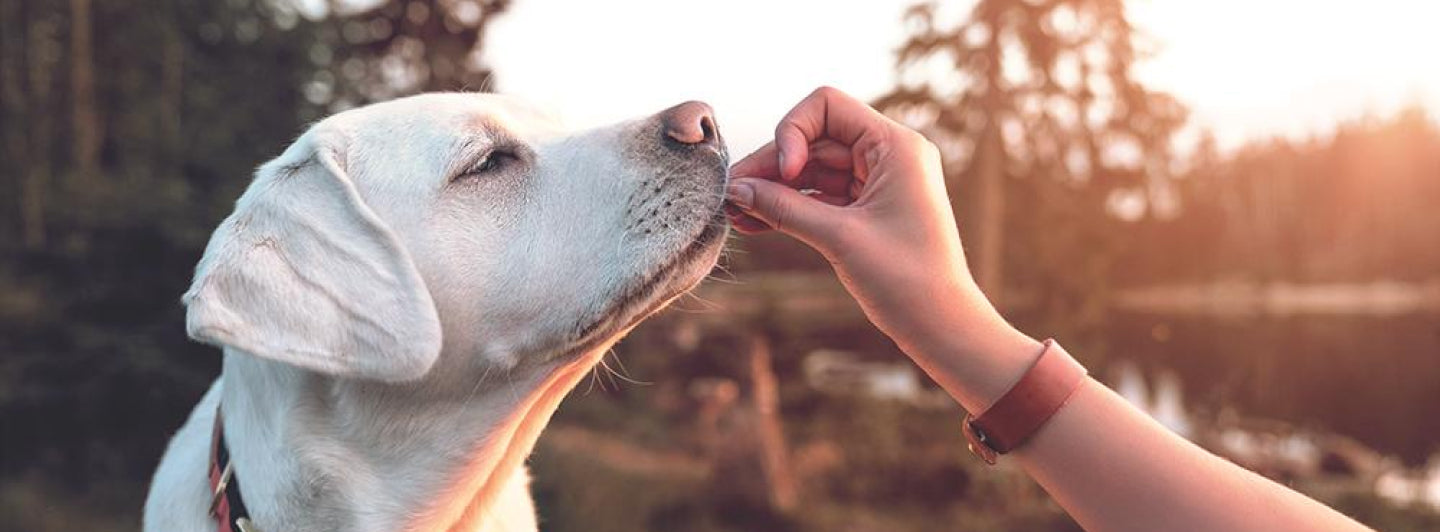
TESTIMONIALS
See how ADAPTIL helped these Dogs:


